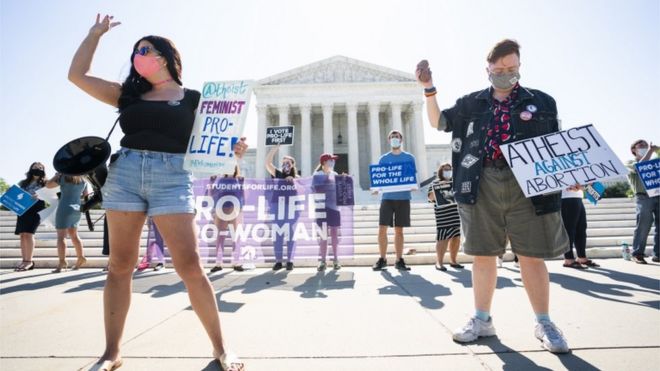US Top Court Strikes Down Law Limiting Abortions

The
law required that doctors providing abortions have admitting privileges to
nearby hospitals, which the justices said led to an undue burden on women.
Chief
Justice John Roberts joined liberal justices in the 5-4 decision in a blow to
anti-abortion groups.
The
court struck down a similar policy in Texas in 2016, the opinion noted.
This
is the first major abortion case ruling from the Supreme Court during the Trump
presidency.
The
2014 Louisiana law said that doctors must hold privileges at hospitals within
30 miles (48km) of their practice - which the state argued was to protect women's
health.
But
critics said the controversial law would limit the number of providers in the
state, violating a woman's right to an abortion.
Medical Services vs
Russo asked the Supreme Court to rule on whether to uphold a lower court's
opinion concerning the Louisiana law.
The
law required doctors to have admitting privileges to a hospital "not
further than 30 miles from the location at which the abortion is performed or
induced" in order to perform abortions.
While
the state said the requirement was to protect women's health, pro-choice
advocates said that it's incredibly rare for women to face complications from
an abortion. They also pointed out that many hospitals in the region are
religiously-affiliated or conservative and don't allow abortions to take place
in their facilities, which severely limits the number of doctors who can carry
out the procedure.
This
then, in turn, constitutes an undue burden on a woman's constitutional right to
seek an abortion, they said.
A
district court agreed that the law was unconstitutional, however, the 5th
Circuit appeals court determined no clinics would "likely be forced to
close" because of the law, and allowed it to stand.
The
petitioners asked the Supreme Court to rule on whether that decision violated
past precedents and should be struck down.
Conservatives have
been given yet another reason to be infuriated by John Roberts.
The
Supreme Court chief justice, appointed by Republican President George W Bush,
provided the decisive vote striking down a Louisiana law regulating abortion
providers.
Roberts'
critics will find little consolation in his argument that while he disagreed
with a five-year-old court precedent in a similar case, he was compelled to
respect it. The other Republican-appointed justices, including the two
nominated by President Donald Trump, all were willing to steer the court toward
allowing greater abortion restrictions.
This
decision, as well as recent holdings on gay rights and immigration, suggests
the ideological disposition of the Supreme Court will again be at stake in
November's upcoming presidential election.
Roberts'
rulings were frequently narrow and technical in nature - reminding liberals of
just how tenuous their victories have been and giving hope to Republicans that
a real conservative majority is just one more appointment away.
Four
years ago, an open Supreme Court seat helped Trump rally doubtful conservatives
to his side, while Democrats seemed less concerned with the court's ideological
future. That may have been enough to carry Trump to his razor-thin victory.
The
president may hope history repeats itself.
Writing the majority opinion, Justice Stephen Breyer disagreed
with the 5th Circuit court reasoning for upholding the Louisiana restrictions.
Justices
Ruth Bader Ginsburg, Sonia Sotomayor, Elena Kagan joined Justice Breyer's
opinion. Justice Roberts concurred, but filed a separate opinion noting that
the reason for the ruling was because of the court's decision "four years
ago invalidating a nearly identical Texas law".
Justice
Roberts, a conservative appointed by President George W Bush, noted that he
dissented in the Texas case, but the question in today's case was not whether
that precedent was right or wrong, "but whether to adhere to it".
The
court's conservatives, Clarence Thomas, Samuel Alito, Neil Gorsuch, and Brett
Kavanaugh dissented.
Justice
Thomas wrote: "Today a majority of the Court perpetuates its ill-founded
abortion jurisprudence by enjoining a perfectly legitimate state law and doing
so without jurisdiction."
Justice
Thomas also took issue with the fact that the lawsuit was brought by abortion
providers, not women themselves, saying for most of the Court's history, it
"maintained that private parties could not bring suit to vindicate the
constitutional rights of individuals who are not before the Court".
"Our
abortion precedents are grievously wrong and should be overruled," he
wrote.
Abortion
rights advocates have said, however, that mandating women come forward to
challenge abortion laws themselves will limit thee number of challenges, as
many patients do not have access to the financial and legal resources.
FROM .bbc.com/news/world-us-canada-53224443

No comments